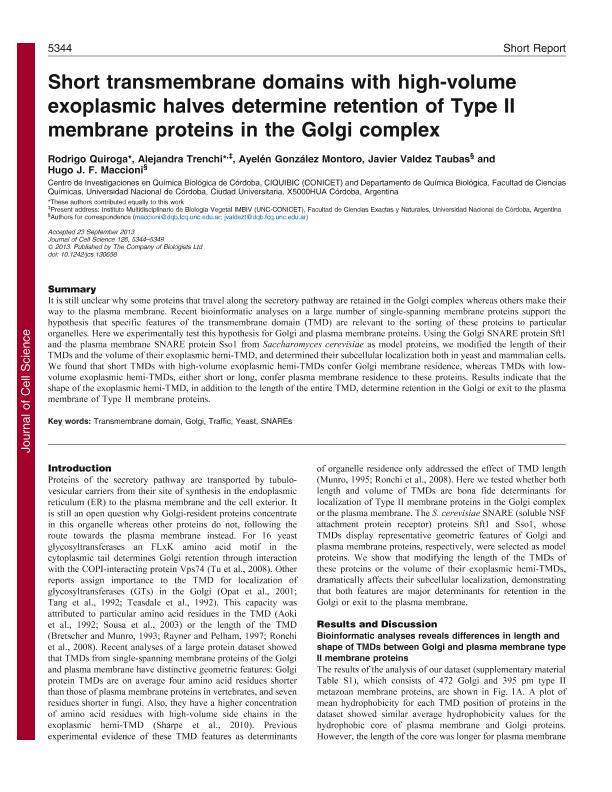Mostrar el registro sencillo del ítem
dc.contributor.author
Quiroga, Rodrigo

dc.contributor.author
Trenchi, Alejandra

dc.contributor.author
Gonzalez Montoro, Ayelén
dc.contributor.author
Valdez, Javier Esteban

dc.contributor.author
Maccioni, Hugo Jose Fernando

dc.date.available
2017-01-09T15:15:57Z
dc.date.issued
2013-12
dc.identifier.citation
Quiroga, Rodrigo; Trenchi, Alejandra; Gonzalez Montoro, Ayelén; Valdez, Javier Esteban; Maccioni, Hugo Jose Fernando; Short transmembrane domains with high-volume exoplasmic halves determine retention of Type II membrane proteins in the Golgi complex; Company Of Biologists; Journal Of Cell Science; 126; 12-2013; 5344-5349
dc.identifier.issn
0021-9533
dc.identifier.uri
http://hdl.handle.net/11336/10971
dc.description.abstract
It is still unclear why some proteins that travel along the secretory pathway are retained in the Golgi complex whereas others make their way to the plasma membrane. Recent bioinformatic analyses on a large number of single-spanning membrane proteins support the hypothesis that specific features of the transmembrane domain (TMD) are relevant to the sorting of these proteins to particular organelles. Here we experimentally test this hypothesis for Golgi and plasma membrane proteins. Using the Golgi SNARE protein Sft1 and the plasma membrane SNARE protein Sso1 from Saccharomyces cerevisiae as model proteins, we modified the length of their TMDs and the volume of their exoplasmic hemi-TMD, and determined their subcellular localization both in yeast and mammalian cells. We found that short TMDs with high-volume exoplasmic hemi-TMDs confer Golgi membrane residence, whereas TMDs with low-volume exoplasmic hemi-TMDs, either short or long, confer plasma membrane residence to these proteins. Results indicate that the shape of the exoplasmic hemi-TMD, in addition to the length of the entire TMD, determine retention in the Golgi or exit to the plasma membrane of Type II membrane proteins.
dc.format
application/pdf
dc.language.iso
eng
dc.publisher
Company Of Biologists

dc.rights
info:eu-repo/semantics/openAccess
dc.rights.uri
https://creativecommons.org/licenses/by-nc-sa/2.5/ar/
dc.subject
Transmembrane Domain
dc.subject
Golgi
dc.subject
Traffic
dc.subject
Yeast
dc.subject.classification
Bioquímica y Biología Molecular

dc.subject.classification
Ciencias Biológicas

dc.subject.classification
CIENCIAS NATURALES Y EXACTAS

dc.title
Short transmembrane domains with high-volume exoplasmic halves determine retention of Type II membrane proteins in the Golgi complex
dc.type
info:eu-repo/semantics/article
dc.type
info:ar-repo/semantics/artículo
dc.type
info:eu-repo/semantics/publishedVersion
dc.date.updated
2016-12-12T14:16:39Z
dc.journal.volume
126
dc.journal.pagination
5344-5349
dc.journal.pais
Reino Unido

dc.journal.ciudad
Cambridge
dc.description.fil
Fil: Quiroga, Rodrigo. Universidad Nacional de Córdoba. Facultad de Ciencias Químicas. Departamento de Quimica Biológica; Argentina. Consejo Nacional de Investigaciones Científicas y Técnicas. Centro Científico Tecnológico Córdoba. Centro de Investigaciones en Química Biológica de Córdoba (p); Argentina
dc.description.fil
Fil: Trenchi, Alejandra. Consejo Nacional de Investigaciones Científicas y Técnicas. Centro Científico Tecnológico Córdoba. Instituto Multidisciplinario de Biología Vegetal (p); Argentina. Consejo Nacional de Investigaciones Científicas y Técnicas. Centro Científico Tecnológico Córdoba. Centro de Investigaciones en Química Biológica de Córdoba (p); Argentina. Universidad Nacional de Córdoba. Facultad de Ciencias Químicas. Departamento de Quimica Biológica; Argentina
dc.description.fil
Fil: Gonzalez Montoro, Ayelén. Universidad Nacional de Córdoba. Facultad de Ciencias Químicas. Departamento de Quimica Biológica; Argentina. Consejo Nacional de Investigaciones Científicas y Técnicas. Centro Científico Tecnológico Córdoba. Centro de Investigaciones en Química Biológica de Córdoba (p); Argentina
dc.description.fil
Fil: Valdez, Javier Esteban. Universidad Nacional de Córdoba. Facultad de Ciencias Químicas. Departamento de Quimica Biológica; Argentina. Consejo Nacional de Investigaciones Científicas y Técnicas. Centro Científico Tecnológico Córdoba. Centro de Investigaciones en Química Biológica de Córdoba (p); Argentina
dc.description.fil
Fil: Maccioni, Hugo Jose Fernando. Universidad Nacional de Córdoba. Facultad de Ciencias Exactas, Físicas y Naturales; Argentina. Consejo Nacional de Investigaciones Científicas y Técnicas. Centro Científico Tecnológico Córdoba. Centro de Investigaciones en Química Biológica de Córdoba (p); Argentina
dc.journal.title
Journal Of Cell Science

dc.relation.alternativeid
info:eu-repo/semantics/altIdentifier/doi/http://dx.doi.org/10.1242/jcs.130658
dc.relation.alternativeid
info:eu-repo/semantics/altIdentifier/url/http://jcs.biologists.org/content/126/23/5344
Archivos asociados
